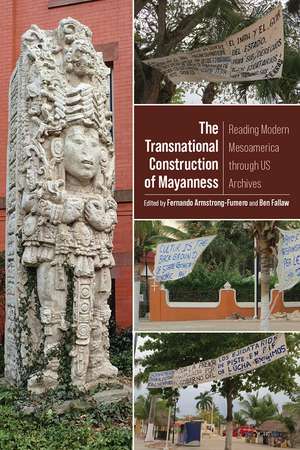The Transnational Construction of Mayanness: Reading Modern Mesoamerica through US Archives
Editat de Fernando Armstrong-Fumero, Ben Fallawen Limba Engleză Paperback – 15 mai 2023 – vârsta ani
Contributors tap documentary, ethnographic, and ethnoarchaeological sources from North America to expand established categories of fieldwork and archival research conducted within the national spaces of Mexico and Central America. A particularly rich and diverse set of case studies interrogate the historical processes that remove sources from their place of production in the “field” to the US, challenge the conventional wisdom regarding the geography of data sources that are available for research, and reveal a range of historical relationships that enabled US actors to shape the historical experience of Maya-speaking peoples.
The Transnational Construction of Mayanness offers rich insight into transnational relations and suggests new avenues of research that incorporate an expanded corpus of materials that embody the deep-seated relationship between Maya-speaking peoples and various gringo interlocutors. The work is an important bridge between Mayanist anthropology and historiography and broader literatures in American, Atlantic, and Indigenous studies.
Contributors: David Carey, M. Bianet Castellanos, Matilde Córdoba Azcárate, Lydia Crafts, John Gust, Julio Cesar Hoil Gutierréz, Jennifer Mathews, Matthew Watson
Preț: 242.80 lei
Nou
Puncte Express: 364
Preț estimativ în valută:
46.47€ • 50.50$ • 39.06£
46.47€ • 50.50$ • 39.06£
Carte tipărită la comandă
Livrare economică 21 aprilie-05 mai
Preluare comenzi: 021 569.72.76
Specificații
ISBN-13: 9781646424269
ISBN-10: 1646424263
Pagini: 256
Dimensiuni: 152 x 229 x 15 mm
Greutate: 0.34 kg
Editura: University Press of Colorado
Colecția University Press of Colorado
ISBN-10: 1646424263
Pagini: 256
Dimensiuni: 152 x 229 x 15 mm
Greutate: 0.34 kg
Editura: University Press of Colorado
Colecția University Press of Colorado
Recenzii
“A searing reckoning with US imperialism in Mexico and Guatemala that resonates especially strongly in the current moment and will continue to do so for years to come. Critical reading for anyone studying settler colonial processes in the Maya area.”
—Maia Dedrick, Cornell University
"A pathbreaking exploration of Mayanness spanning multiple historical periods and national contexts. This collection traces how conceptions of Mayan identity have been shaped by transnational encounters between Mayan people and others—the scholars, officials, tourists and others who have sought to study, claim, or control them."
— Paul Eiss, Carnegie Mellon University
"A must-read for all of those engaging with Maya culture and wishing to critically reflect on the practice of knowledge production on and with indigenous peoples."
—Anthropos
—Maia Dedrick, Cornell University
"A pathbreaking exploration of Mayanness spanning multiple historical periods and national contexts. This collection traces how conceptions of Mayan identity have been shaped by transnational encounters between Mayan people and others—the scholars, officials, tourists and others who have sought to study, claim, or control them."
— Paul Eiss, Carnegie Mellon University
"A must-read for all of those engaging with Maya culture and wishing to critically reflect on the practice of knowledge production on and with indigenous peoples."
—Anthropos
Notă biografică
Fernando Armstrong-Fumero is associate professor of anthropology at Smith College. His published work includes Elusive Unity, as well as numerous articles and chapters on Mayan identity politics, cultural heritage policy, and the history of American anthropology.
Ben Fallaw is professor of Latin American studies at Colby College, Maine. He is coauthor of State Formation in the Liberal Era and Forced Marches and author of Religion and State Formation in Postrevolutionary Mexico.
Ben Fallaw is professor of Latin American studies at Colby College, Maine. He is coauthor of State Formation in the Liberal Era and Forced Marches and author of Religion and State Formation in Postrevolutionary Mexico.
Descriere
The Transnational Construction of Mayanness explores how US academics, travelers, officials, and capitalists contributed to the construction of the Maya as an area of academic knowledge and affected the lives of the Maya peoples who were the subject of generations of anthropological research from the mid-nineteenth century to the present.
